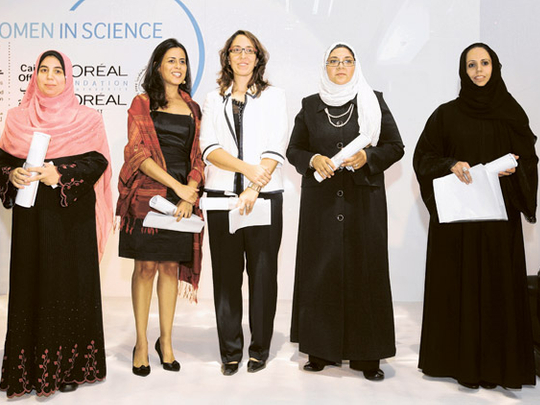
Dubai: Rania Za'arour continues brooding over what her father kept telling her during her school years: "Rania, you can do whatever you want in life, but education will always belong to you and no will take it away from you."
"So education was a top priority in my life," said Rania, who obtained a Ph.D. in cell biology from the Yale School of Medicine, Yale University — one of the top higher education institutions in the world.
She also spent three years on her post-doctoral research at Curie Institute in Paris before joining the University of Sharjah.
"When I think of those [her father's] words, I realise that education is something you get and give to people, you don't lose it. You make them happy, and at the same time, you learn from giving it to them… it is the only thing in life," Rania said.
The Lebanese national, who is in her late 30s, was among the five Arab women to be recently awarded in Dubai for their achievements and contributions to science in the region. The award was part of a L'Oreal-Unesco programme For Women in Science Awards.
Rania received the award for her research on how cancer cells communicate with other cells, including normal cells, in humans.
"It is to understand how cancer cells can live in the human body, though they are not supposed to, and how they succeed in cheating normal cells," Rania told Gulf News in an interview.
Other recognised Arab women scientists were awarded for researches in radiation genotoxicity, photobiology and Leishmania parasite infection on macrophage metabolic pathways.
Arab women, it widely believed, are not involved in scientific research in big numbers for many reasons, including financial, cultural, social and personal. "Generally speaking, Arab men don't accept the idea of prominent Arab women in science," said Jenny Jeehan Nasser, who obtained her Ph.D. in pharmaceutical Analytical Chemistry from Mansoura University in Egypt.
Jenny said she faced some obstacles at the beginning of her scientific career, because "she is a woman", and some men did try to put hurdles in her way.
At the same time, responsibilities at home for women are also considered hindering factors.
Abundant product
"That is why we find Arab women scientists' product is not as abundant of Arab men. The quality could be the same and even better, but not the quantity," Jenny, a mother of four children including a recently born infant, told Gulf News. Personally, "so far, I have been very lucky that I have not felt the obstacles because I am a woman," commented Rania.
However, "even in the US, you see a lot of Ph.D. students, but you don't see the number stay for advanced careers. I think it has to do with women's choice," Rania said, adding that some women feel discouraged by that lack of children day care centres at their work places.
Yet, Rania acknowledges the existence of "some degree of discrimination against women", as well.
Equally important is the amount of money allocated to scientific research, which is by far much more in the West than in the Arab world.
"In our region, it is difficult to work in scientific field, for both men and women, because it is not among our priorities," said Tarek Shawqi, Director of the Regional Bureau for Science in Arab states at the Cairo-based regional Unesco office.
He was referring to financial allocations to scientific research.
Many people, on the other hand, "advise their children to stay away from science because the financial return is not as big and fast as in other fields. They recommend they join other fields," he told Gulf News. And this "phenomenon" needs light to be shed on it.
Research budget
In the West and Far East, it is the largest companies that spend billions of dollars — estimated at $492 billion (Dh1.8 trillion) in 2007 by some surveys — on research and development. But in the Arab region, it is mainly the state that shoulders the responsibility of financing scientific research.
The average Arab expenditure on scientific research doesn't exceed 0.3 per cent of Gross Domestic Product (GDP), noted the Arab Knowledge Report 2009 jointly prepared by UNDP and Mohammad Bin Rashid Al Maktoum Foundation.
"Exception being Tunisia, Morocco, and Libya, whose spending rates are in excess of 0.7 per cent. However, averages reach 3.8 per cent in Sweden, 2.68 per cent in US, 3.51 per cent in Finland, and 3.18 per cent in Japan," the report added.
Honours: L'oreal winners
The 2010 L'Oreal- Unesco For Women in Science Pan Arab Regional fellows are:
Rehab Mohammad Ameen (Egypt), Professor at the National Institute of Laser Enhanced Science in Cairo University: for her academic excellence and the promise of her research in the field of Photobiology.
Rania Za'arour (UAE), Professor at the University of Sharjah, College of Medicine, Department of Basic Medical Sciences: for her academic excellence and the promise of her research into the complex relationship between tumour cells and the surrounding host cells, an important aspect of cancer biology.
Eman Rabhi (Tunisia), Professor at the Pasteur Institute in Tunis: for her academic excellence and the promise of her research about the biological validation of the effect of Leishmania parasitic infection on macrophage metabolic pathways.
Entissar Al Suhaibani (Saudi Arabia), Professor at the King Saud University in Riyadh: for her academic excellence and the promise of her research into radiation genotoxicity.
Jenny Jeehan Nasser (Egypt), Professor at the Faculty of Pharmacy of Mansoura University: for her academic excellence and the promise of her research in the field of Pharmaceutical Chemical Analysis.










